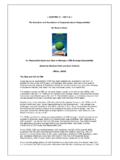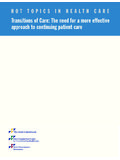Transcription of Threshold Concepts and Troublesome Knowledge
1 Enhancing Teaching-Learning Environments in Undergraduate Courses Project, Higher and CommunityEducation, School of Education, University of Edinburgh, Paterson s Land, Holyrood Road, EdinburghEH8 8AQ. Tel: +44 (0)131 651 6669, email: URL: Environmentsin Undergraduate CoursesThreshold Concepts andTroublesome Knowledge :Linkages to Ways of Thinking andPractising within the DisciplinesOccasional Report 4, May 2003 ECONOMIC& SOCIALRESEARCHCOUNCILE S R CTeaching & LearningResearch ProgrammeT L R PJan Meyer and Ray LandprojectETLT hreshold Concepts and Troublesome Knowledge : Linkages to Ways of Thinking and Practisingwithin the DisciplinesOccasional Report 4 ETL Project, Universities of Edinburgh, Coventry and Durham, Teaching-Learning Environments in Undergraduate Courses ProjectHigher and Community EducationSchool of EducationUniversity of EdinburghPaterson s LandHolyrood RoadEdinburgh EH8 : +44 (0)131 651 6669email: ETL Project is funded by the Economic and Social Research Council as part of its Teaching andLearning Research ProgrammeURL.
2 Teaching-Learning Environments in Undergraduate Courses Project, Occasional Report 4 Threshold Concepts and Troublesome Knowledge :Linkages to Ways of Thinking and Practising within the DisciplinesABSTRACTThis report arises from ongoing research undertaken by the Economics team of the Economicand Social Research Council s Teaching and Learning Research Programme Project Enhancing Teaching and Learning Environments in Undergraduate Courses (ETL). TheProject forms part of Phase II of the Programme. The ETL Project is seeking to identify factorsleading to high quality learning environments within five disciplinary contexts across arange of higher education institutions. Meyer s notion of a Threshold concept was introducedinto project discussions on learning outcomes as a particular basis for differentiating betweencore learning outcomes that represent seeing things in a new way and those that do not.
3 Athreshold concept is thus seen as something distinct within what university teachers wouldtypically describe as core Concepts . Furthermore, Threshold Concepts may represent, or leadto, what Perkins (1999) describes as Troublesome Knowledge Knowledge that is conceptuallydifficult, counter-intuitive or alien . Drawing both on project interviews and on observationscontributed by academic colleagues from a range of disciplines , the report attempts to definecharacteristics of Threshold Concepts and, in the light of Perkins work, to indicatecorrespondences between the notion of Threshold Concepts and that of Troublesome INTRODUCTIONA Threshold concept can be considered as akin to a portal, opening up a new and previouslyinaccessible way of thinking about something. It represents a transformed way ofunderstanding, or interpreting, or viewing something without which the learner cannotprogress. As a consequence of comprehending a Threshold concept there may thus be atransformed internal view of subject matter, subject landscape, or even world view.
4 Thistransformation may be sudden or it may be protracted over a considerable period of time,with the transition to understanding proving Troublesome . Such a transformed view orlandscape may represent how people think in a particular discipline, or how they perceive,apprehend, or experience particular phenomena within that discipline (or more generally). Itmight, of course, be argued, in a critical sense, that such transformed understanding leads toa privileged or dominant view and therefore a contestable way of understanding would give rise to discussion of how Threshold Concepts come to be identified andprioritised in the first instance. However, first we require simple illustrative example can be taken from the kitchen. Cooking is fundamentally aprocess of using heat (in various degrees and sources) to effect desired outcomes. In physicsone encounters the concept of heat transfer and its mathematical formalisation (as anequation) that represents heat transfer as a function of something called the temperaturegradient.
5 It is not necessary to have a sophisticated understanding of physics to have thisprinciple quite simply illustrated. Imagine that you have just poured two identical hot cupsof tea ( they are at the same temperature) and you have milk to add. You want to cooldown one cup of tea as quickly as possible because you are in a hurry to drink it. You add themilk to the first cup immediately, wait a few minutes and then add an equal quantity of milkto the second cup. At this point which cup of tea will be cooler, and why? (The answer is thesecond cup, because in the initial stages of cooling it is hotter than the first cup with the milkin it and it therefore loses more heat because of the steeper temperature gradient.) When thephysics of heat transfer is thus basically grasped by people in terms of things specific to whatgoes on the kitchen, it will fundamentally alter how they perceive this aspect of cooking, and1 Enhancing Teaching-Learning Environments in Undergraduate Courses Project, Occasional Report 42they might consequently even filter out what to look for (the signified!)
6 When they watch thebetter class of television cookery programmes; for example, a focus on the pots and pans thatare selected by the chef in context (the heat source in relation to the cooking process to beapplied as a function of time and its regulation to the ingredients) rather than simply on theingredients and, superficially, the method . So it could be said that, as a stand-aloneexample, heat transfer or, more precisely, controlling the rate of heat transfer, is a thresholdconcept in cookery because it alters the way in which you think about cooking. And, in thespecial case where barbecuing is the method of cooking (where heat transfer is via radiation)you also have to take into account the inverse square law, which explains why so manypeople find barbecuing a Troublesome notion. We shall return to the notion oftroublesomeness Threshold Concepts AND Troublesome KNOWLEDGEWITHIN SUBJECT DISCIPLINESOur initial round of project interviews with teaching staff in Economics, together with anumber of wider discussions with practitioners in a range of other disciplines andinstitutions, have led us to conclude that a Threshold concept can of itself inherentlyrepresent what Perkins (1999) refers to as Troublesome Knowledge Knowledge that is alien , orcounter-intuitive or even intellectually absurd at face value.
7 It increasingly appears that athreshold concept may on its own constitute, or in its application lead to, such a student learning perspective let us consider some examples from pure mathematics,firstly that of a complex number a number that is formally defined as consisting of a real and an imaginary component and which is simply expressed in symbolic (abstract) terms asx + iy, where x and y are real numbers (simply put, the numbers we all deal with in the real world; numbers we can for example count on our fingers), and i is the square root of minus 1( 1). In other words i is a number which when squared (multiplied by itself) equals minusone (-1). So a complex number consists of a real part (x), and a purely imaginary part (iy).The idea of the imaginary part in this case is, in fact, absurd to many people and beyondtheir intellectual grasp as an abstract entity. But although complex numbers are apparentlyabsurd intellectual artifacts they are the gateway to the conceptualization and solution ofproblems in the pure and applied sciences that could not otherwise be pure mathematics the concept of a limit is a Threshold concept; it is the gateway tomathematical analysis and constitutes a fundamental basis for understanding some of thefoundations and application of other branches of mathematics such as differential andintegral calculus.
8 Limits, although not inherently Troublesome in the same immediate senseas complex numbers, lead in their application to examples of Troublesome Knowledge . Thelimit as x tends to zero of the function f(x)=(sine x)/x is in fact one (1), which is counterintuitive. In the simple (say, geometric), imagining of this limit is the ratio of two entities (thesine of x, and x) both of which independently tend to zero as x tends to zero and which arealso (an irrelevant point, but a conceptual red herring if the Threshold concept of a limit is notunderstood) respectively equal to zero when x equals zero. So the Troublesome knowledgehere then (based on mathematical proof) is that something which is getting infinitesimallysmall divided by something else doing the same thing is somehow approaching one in thelimiting mathematicians themselves are aware of issues that surround Threshold Concepts isevident from the work of Artigue (2001, ) who refers to a theory of epistemologicalobstacles and, by way of summary, gives as a first example of such obstacles.
9 The everyday meaning of the word limit , which induces resistant conceptions of thelimit as a barrier or as the last term of a process, or tends to restrict convergence tomonotonic Teaching-Learning Environments in Undergraduate Courses Project, Occasional Report 43By way of more complex examples, the idea is then developed that, as forms of Knowledge , epistemological obstacles constitute resistant difficulties for literary and cultural studies the concept of signification can prove problematic, even subversive , in that it undermines previous beliefs, and leads to Troublesome knowledgeinsofar as the non-referentiality of language is seen to uncover the limits of truth claims. Forexample, the recognition (through grasping the notion of signification) that all systems ofmeaning function like signifiers within a language, (that is, that terms derive meaning fromtheir relationship to each other, rather than in any direct empirical relationship with a reality ) leads on to an understanding that there are no positive terms.
10 Hence the basis ofmany systems of meaning, including positivist science and the basis of many religious andmoral systems, falls into question. This can be a personally disturbing and disorientingnotion leading to hesitancy or even resistance in learners. Other aspects of post-structuralistpractice such as techniques of deconstruction for analyzing literary texts (with a strongemphasis on the ironic, the contradictory, the ludic) often appear counter-intuitive, lookingfor absences, or what is not there, in order to gain insights into how the text is currentlystructured by a prevailing set of (occluded or tacit) values or final illustrative example from Economics will suffice, again from the perspective ofstudent learning. The concept of opportunity cost has been put forward as one of manyexamples of a Threshold concept in the study of economics. Martin Shanahan1 assesses thetransformative effect of this concept as follows: Opportunity cost is the evaluation placed on the most highly valued of the rejectedalternatives or opportunities (Eatwell, 1998, vol 3, ).





